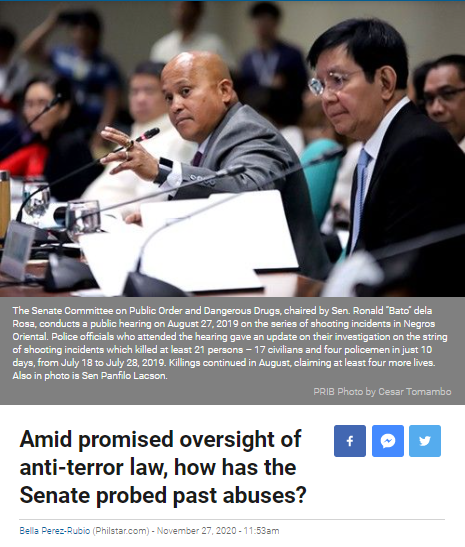Cheers! Philstar.com documents poor Senate record as watchdog against abuse

ONLY TWO senators dissented when the Senate passed its third and final version of the Anti-Terrorism Bill in February, amidst protests about the potential for abuse in the implementation of the law and senators’ assurances about sufficient safeguards. The now-enacted Anti-Terrorism Act has since been challenged by numerous petitions in the Supreme Court.
How much can be expected of the Senate to check such abuses?
CMFR cheers Philstar.com for its close look at the track record of the Senate in exercising its oversight powers against abuse of power by the police and military. Published on November 27, the article “Amid promised oversight of anti-terror law, how has the Senate probed past abuses?” explained that the Congress’ power to inquire and investigate has a legal basis in Article VI, Section 21 of the 1987 Constitution and in the Supreme Court’s ruling on Neri v. Senate.
Based on Senate records and interviews with senators who opposed the law, the report questions the body’s capacity or even intent to fulfill its promise to protect citizens against state violations of their fundamental rights.
Its findings include the following:
- The 18th Congress, which convened July 2019, had only seven resolutions filed to investigate supposed abuses. Of these, only three received enough attention and concern to deserve a Senate hearing: the killing of civilians and uniformed personnel in Negros; the shooting of four soldiers in Sulu, and the red-tagging of personalities, groups and institutions. Only one committee report — on the Negros killings — was filed, urging the PNP’s Internal Affairs Service to investigate and gather evidence themselves.
- The 17th Congress may have filed more resolutions but held hearings only to investigate a few. More disturbing, hearings on extrajudicial killings related to the drug war produced a committee report that incredibly found insufficient evidence of the existence of the Davao Death Squad. The same report concluded that there was no proof of any state policy to commit extrajudicial killings in its “war on drugs.”
- The Senate process accommodates political expediency. The Senate committee which receives the resolution for action does not have to justify its decision to hold a hearing or not, or to simply set it aside. It is not required to explain the basis of its decision.
- The report cited Sen. Leila De Lima’s observations: The current administration’s coddling of state forces and Duterte’s willingness to pardon them, and the independence of the current Congress’ being compromised by the “subservience of many of our colleagues to the president.”
- Sen. Richard Gordon who chairs the Blue Ribbon Committee also chairs the Committee on Justice and Human Rights. He may not have the time to cover the requests for investigation. Sen. De Lima also told Philstar.com that the Senate lacks “senior lawyers” who are best qualified to share Gordon’s burden.
The report said Senators Panfilo Lacson and Vicente Sotto III insist on the law’s having sufficient safeguards against abuse, largely blaming misinformation for the widespread opposition to the Anti-Terrorism Act. But the article noted how the 37 petitions filed in the Supreme Court indicate sufficient analysis of the law’s infirmities and potential for abuse.
Philstar.com’s report calls attention to the lack of substance in the Senate’s promises and how these may be proven hollow.
The rest of the media should follow suit in reporting vigilantly on the Senate’s failure to respond and act promptly on cases that demonstrate the tendency of law enforcement agents to act under cover of the new anti-terror measure.
But to do this, the media must not fail to be vigilant themselves and on their own, to call attention to the cases of abuse before they make the impunity of state forces even worse.
Leave a Reply